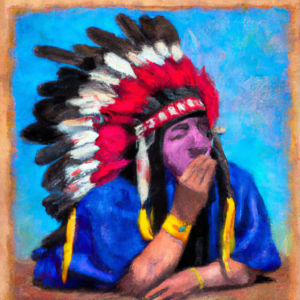Redistributing Loot to Benefit the Tribe How Apache Raiders Shared Their Spoils Strategically, Ensuring the Survival of the Tribe Through Redistribution
Introduction
Under the vast Arizona sky, the smell of sagebrush mingled with the dust of the earth. A band of Apache raiders, seasoned by countless encounters, returned from a successful foray. Their horses, laden with the spoils of their bravery, carried not just goods but the hopes of their community. E warriors knew that true strength lay not in individual gain but in how they shared their fortunes with the tribe.
This wise practice of redistribution ensured survival, fostering solidarity among the members. Each item taken–whether it was food, tools, or textiles–was viewed not as a victory for the individual but as a lifeline for the entire community. Through strategic sharing, the Apaches reinforced their bonds, creating a safety net that caught them in times of need.
Emphasizing the collective good, Apache raiders exemplified the idea that wealth loses its value if hoarded. R wisdom taught that prosperity, shared among all, cultivated resilience. This rich tradition of resource allocation not only enriched the tribe but also fortified their cultural identity, reflecting the essence of their communal spirit.
In this article, we explore how Apache raiders skillfully redistributed their loot. By examining their practices and principles, we uncover lessons that resonate today. Apache model reveals the profound strength found in unity, timeless wisdom that empowers future generations to thrive against adversity.
Historical Context
The Apache tribes, known for their resilience and adaptability, thrived in the arid landscapes of the American Southwest. Their way of life centered around community and survival, where each member played a pivotal role in sustaining the tribe. This unity was especially crucial during the tumultuous periods of European colonization and intertribal conflicts, which often disrupted their traditional ways of living.
Raiding became a common strategy for the Apache, as it provided necessary resources, including food, tools, and horses. But, these actions were not merely about personal gain; they embodied a deep-seated principle of redistribution. By sharing the acquired spoils, Apache raiders ensured that the entire community benefited, reinforcing social bonds and mutual support critical for survival in harsh conditions.
Apache wisdom emphasized the importance of collective welfare over individual wealth. This philosophy guided their actions and decisions, fostering a culture where the spoils of raiding were seen as a communal resource. Leaders and warriors alike understood that the success of one directly influenced the well-being of the entire tribe, creating an intricate web of responsibility.
Throughout history, Apache groups exemplified strategies that balanced personal ambition with communal needs. They carefully calculated the benefits of their raids, weighing the immediate gains against the long-term health of their society. This strategic redistribution not only reinforced social ties but also ensured the tribes’ resilience in the face of adversity.
Apache Raiders Spoils Redistribution for Tribal
An Apache Story
Apache culture emphasized community and survival, guiding their approach to raiding and redistribution. When raiders returned with spoils, they viewed the loot not as personal gain but as a shared resource essential for the tribes well-being. This practice created a strong bond among tribe members, reinforcing interdependence and solidarity. By pooling their resources, Apaches diminished risk and ensured that even the most vulnerable had access to necessary supplies.
Redistributing loot worked on several levels within Apache society. First, it fostered a sense of equality among community members, as each person received a fair share according to need. Secondly, it cultivated loyalty and trust between raiders and non-raiders, ensuring that everyone had a stake in the outcomes of raids. Lastly, this strategy allowed for efficient use of resources, enabling the tribe to thrive despite challenging conditions.
Among the Apache, the act of sharing was deeply rooted in their wisdom. As one elder stated,
To take alone is to take from the whole; to share is to grow together.
This belief guided their actions, as sharing spoils of war reflected their values and priorities. By ensuring that no one was left behind, the tribe increased its strength and resilience over time.
The redistribution of loot not only satisfied immediate needs but also prepared the tribe for future challenges. Process involved careful planning and assessment of each members’ situation. Community members discussed openly, creating a dynamic system that adapted to changing circumstances.
Ultimately, this cultural practice demonstrated a profound understanding of interconnectedness. Every Apache knew that their survival depended on the well-being of others in the community. Through strategic sharing, they cultivated a robust, united front equipped to face external threats and internal struggles alike.
In the heart of the sun-bleached desert, where the endless sky brushed against the rugged mountains, there lived a tribe whose resilience was as fierce as their spirit. This was a time of struggle, where resources were scarce, and the winds carried whispers of danger. Among the brave warriors of this tribe was Gain-nah-tah, a leader known for his courage and wise heart, who stood ready to defend his people from impending threats.
One evening, as the sun dipped below the horizon, painting the sky in fiery hues, Gain-nah-tah gathered his trusted warriors, Kan-DA-zis Tlishishen and Niki, in the flickering glow of the campfire. Warmth of the flames cast shadows among them, transforming their strong silhouettes into a picture of unity. Tonight, we discuss not just our battle plans, but how we will share what we take from our enemies, Gain-nah-tah declared, his voice steady, each word resonating with purpose.
Many have fallen, and we must honor them by using any spoils to strengthen our tribe, he continued, glancing at the skies speckled with twinkling stars. Kan-DA-zis Tlishishen nodded, his eyes shimmering with the firelight, We are not thieves, but warriors with a duty. Spoils should empower our elders and feed our children. Niki, always contemplative, suggested, Let us remember our tradition of sharing. A single buffalo may feed a family, but when shared, it can open the doors of community and hope for all.
The next dawn brought the clash of steel and the sounds of the earth shaking beneath the fierce battle between warriors. Gain-nah-tah led the charge, his spirit unyielding, embodying the strength of the mountain. As they reclaimed the spoils from their enemies, they remembered their promise to share, to ensure that every life was nourished.
After the battle, under the shade of a sprawling cottonwood tree, Gain-nah-tah addressed his people, who were gathered around, hearts filled with gratitude. Today, we have not only defended our land but our way of life, he proclaimed, arms wide as he spoke. What we take is not for any one of us alone. Let us gather what we have, and distribute it wisely. The warriors formed lines, and in a display of harmony, they brought forth their shares, distributing the food and goods to those who needed them most, ensuring that no child went hungry that night.
As stories of their bravery spread, clans from far and wide admired their strength not just in battle, but in their commitment to unity. We are a tribe, bound by more than blood, Gain-nah-tah reminded, Our strength lies in our togetherness. They understood that each act of generosity sowed the seeds for a more prosperous future.
In the quiet of the night, as the stars twinkled like the eyes of ancestors watching over them, Gain-nah-tah reflected on the battle and its fruits. The spoils are sweet, he whispered, but sweeter still is the love we share through them.
This tale teaches us that true strength is not only displayed in battles won but in how we choose to uplift one another. Gain-nah-tah reminds us that through unity and generosity, a tribe flourishes, and survival goes beyond the physical; it blooms within the spirit of community. How can we, in our lives, create a stronger sense of community through our actions and choices, just as Gain-nah-tah and his warriors did?
Practical Applications
Redistributing Loot to Benefit the Tribe: A Practical Guide
Implementing the principles of resource redistribution, inspired by Apache values, can create a more cohesive and supportive community. By ensuring that everyone’s needs are met, not just those of a few, we enhance the overall survival and well-being of the group. Here show you can incorporate these principles into your daily life.
Practical Steps for Redistribution
- Assess Your Resources: Begin by evaluating what you have–this can include skills, time, and material possessions. Understanding your wealth allows you to identify what can be shared with others in need.
- Identify Community Needs: Reach out to friends, family, or local organizations to discuss their needs. Engaging in conversations can shed light on who might benefit most from your resources.
- Create a Sharing Plan: Outline a structured plan that specifies how often and what resources will be redistributed. For instance, you might decide to donate food or volunteer time weekly to a local shelter.
- Encourage Participation: Motivate others to join you in this effort. When people see the impact of sharing within the community, they’ll more likely want to contribute their own resources.
- Implement a Tracking System: Use a simple journal or a digital app to keep track of what resources have been shared and the impact they’ve made. This not only maintains accountability but also provides motivation as you see the positive results.
- Reflect and Adjust: Regularly evaluate the effectiveness of your sharing practices. Are the needs of your community being met? Be open to adjusting your approach based on feedback.
- Celebrate Successes: Acknowledge and celebrate the positive outcomes of your redistribution efforts, whether through community gatherings or shout-outs on social media. Celebrating reinforces the value of sharing.
Potential Challenges and Solutions
While the principles of redistribution may seem noble, challenges can arise. Some might hesitate to share due to a fear of not having enough for themselves. To overcome this, cultivate a mindset of abundance by recognizing that sharing often leads to a more supportive network.
Another challenge can be the reluctance of others to accept help. Foster a culture of generosity where giving and receiving are seen as acts of community strength, not weakness. Share stories of those who benefited from such exchanges to encourage openness.
Tips for Maintaining Consistency
Consistency is crucial when implementing these principles. One strategy is to set specific days or occasions for sharing, making it a routine within your life. Consider starting small, perhaps dedicating one day a month to volunteer or donate.
Also, find an accountability partner–someone who can join you in this journey and keep you motivated. Sharing your experiences or goals with them can reinforce your commitment.
Lastly, embrace the spirit of Apache cultural practices, which emphasize the importance of community. Remind yourself regularly why you chose to embark on this journey: to uplift your tribe and ensure everyone’s survival and well-being.
What creative ways can you think of to begin redistributing resources today? Join forces with your community and make a difference!
Apache Raiders Spoils Redistribution for Tribal
Conclusion
To sum up, the strategic redistribution of loot among Apache raiders exemplifies a profound understanding of community dynamics and survival. By sharing spoils, these warriors not only ensured the immediate well-being of their tribe but also fostered a sense of unity and collective responsibility. This practice allowed the Apache to adapt and thrive in challenging environments, emphasizing the vital role of cooperation and support.
Key lessons emerge from the Apache approach: prioritizing community over individual gain and recognizing that shared resources strengthen bonds. By learning from their wisdom, modern communities can embrace similar principles of collaboration and mutual aid. This mindset encourages resilience and sustainability, enabling us to navigate our own challenges effectively.
Let us take inspiration from the Apaches legendary practices. As we encounter obstacles in our lives, we must remember the power of sharing and supporting one another. Together, we can build a stronger future rooted in collaboration and communal strength.
More Resources
Dive deeper into the fascinating world of Apache wisdom and its modern applications. Explore these thought-provoking questions to expand your understanding of the concepts discussed in this article.
Explore Further with Google
- How can we learn from tribal ceremonies in our modern life?
- How can we respect tribal ceremonies in our environmental challenges?
- How do ancestral teachings contribute to personal growth?
Discover Insights with Perplexity
- How do traditional storytelling methods convey timeless wisdom?
- What role do cultural traditions play in contemporary mindfulness?
- How do traditional practices influence environmental stewardship?
By exploring these questions, you’ll gain a richer appreciation for indigenous cultures, environmental stewardship, and mindfulness practices. Each link opens a gateway to deeper knowledge, helping you connect ancient wisdom with contemporary life.
Thank you for reading!







